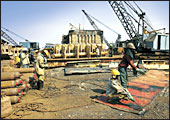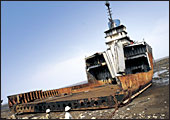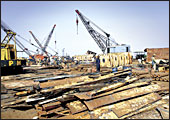 |
| Place of final rest: Steel from the
dismantled ships is sold to re-rolling mills on the road to
Bhavnagar |
 |
| Grounded: A buoyant global economy has
meant fewer vessels to break |
ALANG-SISOYA
Tuesday, June 20, 2006
The
ground shudders as a massive pile of steel comes crashing down.
Until then, that monstrous piece of metal used to be the cargo
doors of a ship. I am standing on Plot 54 on the Alang beach,
talking to Manish Shah, Executive Director of Rushil Industries.
Not far away from where we stand, a gang of workers, wearing safety
gloves, gum boots and masks (unlike five years ago), is cutting
into the hull of a ship with ordinary blowtorches. All around
us on the beach are tens of massive rusting carcasses of ships,
waiting to be picked clean not by vultures, but humans. When you
are a ship, Alang is your final port of call. A place where you
drop anchor for one last time and await rebirth not as another
vessel but twisted rods of steel. Alang is one of the world's
biggest ship breaking yards. And Shah, who's spent almost 20 years
in Alang, is one of the 150 ship breakers around here.
Sometime next week, a controversial ship
will run aground on Plot 5 of Alang beach. Called the Blue Lady,
it is a 46-year-old cruise ship owned by Star Cruises, which has
decided to sell it as scrap to Rajeev Reniwal in Alang. That's
46,000 tonnes of steel, besides furniture, cutlery, wooden cabinets
etc. Still, the mood in Alang is grim-not because the 315-metre
long ship (more than four times the size of Delhi's Qutab Minar)
carries toxic asbestos in its piping and has raised the hackles
of environmentalists. The ship breakers don't care because India's
Supreme Court has already allowed its entry into Indian waters.
And neither are they worried about the wave of resentment that
is sweeping across France against Star Cruises for destroying
what many French consider a piece of national history (among others,
legendary Spanish painter Salvadore Dali travelled on this cruise
ship, where eight crewmen died after a boiler room blast in 2003,
prompting the owners' decision to junk it).
The mood is sombre because Alang, once the
world's largest ship breaking centre, is dying a slow death. Five
years ago, 333 ships met their fate in Alang, two years ago the
number fell to 294, and in the first half of last year, the count
was a mere 66. In terms of steel recovered, the quantity has plunged
from 2.72 million tonnes to just 310,000 tonnes, and the number
of workers has dropped from 50,000 to about 10,000 today. "So
many people have already left that I don't know how much longer
I can carry on as well," says Rajkumar Bansal, proprietor
of Shridi Steel Traders and President of the Ship Recycling Industries
Association, who owns plots 40 and 41. I believe him. Earlier
in the day, our local cab driver had brought us up to speed on
the desperate state of affairs in Alang. "Even the prostitutes
have left Alang," he had told us with a laugh.
 |
| Losing labour: Despite lucrative wages
(up to Rs 400 a day), Alang has seen an exodus of workers |
There are two reasons why Alang is going downhill.
One is the robust global economy, which means no fleet owner wants
to junk a vessel when it can be kept in service profitably. So,
there aren't as many ships available for recycling. The other
reason has to do with the capacity addition in Indian steel industry.
An abundance of steel from primary producers has meant that recycled
steel from the re-rolling mills is no longer competitive. Lower
prices mean that Alang's ship breakers aren't able to bid aggressively
for ships. In fact, they are increasingly being outbid by Bangladeshi
rivals. "We can only pay between $325-350 (Rs 14,950-16,100)
per tonne for the big ships, but in Bangladesh they are willing
to pay as much as $400 (Rs 18,400)," says a former Alang
ship breaker who quit the business in frustration. Unlike India,
Bangladesh is a steel-scarce country.
 |
| No more junk: Rajkumar Bansal is not
sure how long he can swim against the tide |
Mind you, that's despite the ship breakers
picking their vessels clean. On the road to Alang, you can buy
just about everything from inside a ship: lifeboats, kitchen utensils,
sofas, cabin doors and even medical supplies. "That's why
so many of the village huts nearby have doors," my driver
tells me with a grin. But even here, the business is bad, other
than for utensils. The machinery plants, where old ship engines
and generators are refurbished, are barely surviving. In Bhavnagar,
the entry point to Alang by air, the main hotel "Sun 'n'
Shine" reports only 30 per cent occupancy. "I am lucky
if the hotel makes any money," sighs Rajiv Sharma, its general
manager.
But the only optimist in Alang, Manish Shah
of plot No. 54, is keeping his chin up. "Listen," he
tells me and I do, "ships will always have to be broken,
the economy will turn and the business will be good in a few years.
Will it be back to what it was? Unlikely, but it can't remain
this bad. The Blue Lady coming here will get us good attention."
When it's your job to lay to rest the hopeless, it makes sense
to have hope yourself.
|







